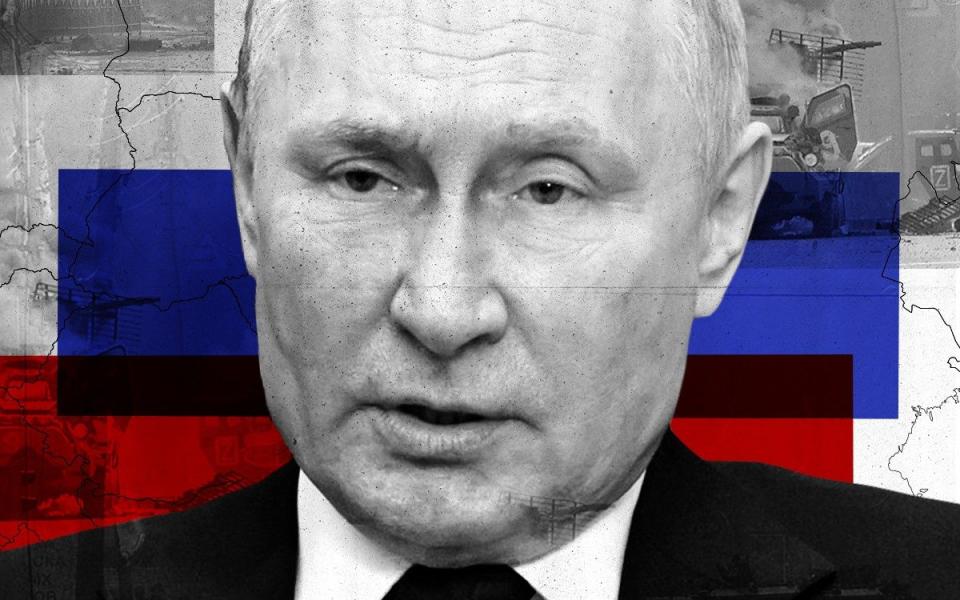
Vladimir Putin is doing everything he can to speed up the Russian war machine.
This is why the country’s economy – if we are to believe Moscow’s figures – has held up better than one might have expected in the face of Western sanctions. Rather than reflecting anything vaguely resembling prosperity, the statistics show that more weapons are being produced for the meat grinder in eastern Ukraine.
The resources that finance this include oil revenues. Rising oil prices send more money into the Kremlin’s coffers, largely through sales via Moscow’s “ghost fleet” of embargo-breaking tankers, black gold to clients without moral scruples in favorable or non-aligned countries.
But Putin’s financial firepower does not include a previously reliable source of cash: natural gas.
Gazprom, the largely state-owned energy giant, has fell to its worst loss in a quarter centurylosing 629 billion rubles, the equivalent of £5.5 billion, last year as its revenue fell by more than a quarter in ruble terms.
This is the largest loss in at least 25 years. This loss is a humiliation for the company and for the regime. Putin believed the vast network of pipelines carrying his gas to Europe had created a dependency that would force Western leaders to step back and allow him to seize Ukraine, unwilling to wean itself off energy supplies .
Before the war, this was a widespread opinion. Long after the capture of Crimea and the war in Donbass, Germany in particular pursued Russian gas deals, including the construction of the Nord Stream 2 pipeline, which was to come into operation when Putin launched his all-out invasion in February 2022.
Gerhard Schroeder, Germany’s former chancellor, built a career in Russia’s energy industry after leaving office, hanging on to his post as chairman of oil giant Rosneft for three months after the assault.
But European leaders did not comply with this proposal. When Putin refused gas supplies, hoping a cost of living crisis would change their minds, instead of reaching an agreement they found sources elsewhere.
Olaf Scholz, chancellor of Germany, which built much of its industrial prowess on cheap Russian energy, has vowed that the country should “never again” become so beholden to hostile suppliers.
In 2021, more than 40% of the European Union’s gas imports came from Russia. This figure fell to 8% last year, according to the European Commission.
In gross volumes, the decline took purchases from just over 150 billion cubic meters to just under 79 billion in 2022 and to less than 43 billion last year.
Once contracts for gas supply via pipelines passing through Ukraine end, they are not expected to be renewed, which would further reduce Russian sales.
Norway is now the EU’s largest supplier of gas imports, increasing its sales from 79.5 billion cubic meters to 87.8 billion.
Britain imported little natural gas from Russia before the war – Norway, Qatar and the United States were all bigger suppliers – and purchases have since been banned.
Gazprom stopped publishing details of its exports at the start of 2023, but overall its sales outside Russia fell by more than half last year.
Europe replaced the loss of Russian gas at considerable cost, but new networks have now been established, meaning Moscow has forever lost its grip on the Western market.
Liquefied natural gas, imported by tanker truck, has grown in importance. The EU added its capacity to import another 40 billion cubic meters of LNG last year and plans to increase its capacity by another 30 billion this year.
Bill Weatherburn, a commodities specialist at Capital Economics, calls the continent’s efforts “very successful.”
“It used to be a stable, stable, reasonably cheap gas pipeline, and they were able to build the infrastructure to import liquefied gas from global markets,” he says.
European imports from the United States, abundant in gas since the hydraulic fracturing boom, increased from just under 19 billion cubic meters in 2021 to 56.2 billion in 2023.
Qatar supplied 15.5 billion cubic meters last year, almost matching British gas sales to the continent.
Weatherburn sees this situation as “stable, in the sense that the United States is going to massively increase its LNG capacity – there will be more at the end of this year and into next year.”
However, prices may be less predictable in the months to come.
“A breakdown in any part of the world will now affect the price of gas in Europe. Last year there was talk of strikes at an LNG facility in Australia. Even though Europe does not buy LNG from Australia, European prices soared because they were likely to compete more strongly with Asia for other supplies,” he says. .
Meanwhile, Gazprom is looking for ways to reach new customers. As with Russian oil, there are buyers who will be happy to take its natural gas without worrying too much about the consequences for Ukraine.
Some gas was diverted to China and Uzbekistanbut plans to move further toward a major new pipeline are encountering difficulties, despite pre-war plans to expand into the Asian market.
Energy Aspects’ James Waddell says the militarization of gas sales to Europe has left Russia without a big market.
“Gas is much more difficult to transport than oil or coal. You have to build very long, very expensive pipelines that take years to build, or liquefaction terminals that also take years to build,” he says.
Even attempts to build these LNG terminals are being undermined by Western sanctions.
“Everything that was lost in Europe was basically locked up in Russia or directed to the local market,” says Waddell.
Putin used a backdoor: “Russia has developed some of its own gas-intensive industries. One of the biggest is urea production, and they sell a lot of fertilizer in Europe,” says Wadell.
These are the remains of Putin’s once-mighty gas industry.


